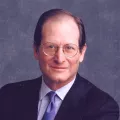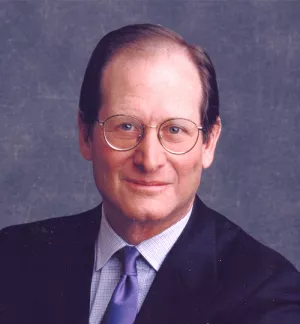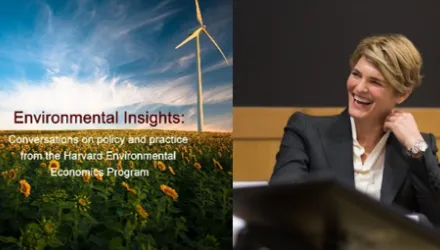The paradox of the United States Supreme Court is that, from one perspective, it is a traditional judicial institution deciding individual cases. But from another perspective, it makes broad value choices in the name of constitutional interpretation; strikes down acts of democratically elected legislatures; and issues rules with impact on our national life as great or greater than Acts of Congress.
This paradox is vividly reflected in the Court's decision in Citizens United v. Federal Election Commission which, on First Amendment grounds, invalidated Congressional limits on independent expenditures by corporations and unions in support of candidates (and by implication limits on such expenditures in about half the States). By a 5-4 vote, the Court explicitly overruled two of its own recent cases and blew away years of bi-partisan Congressional effort to address the problem of money in politics.
Citizens United is just the latest piece in the historic puzzle of judicial review when the court invokes the broad, majestic phrases of the Constitution--protecting free speech, prohibiting establishment of religion, securing due process, requiring equal protection, banning cruel and unusual punishment--and fills in constitutional content with its own value choices to invalidate actions of other governmental institutions.
As many scholars have written, these choices by individual justices can result from a combination of factors: law, facts, personal history, current personality, ideology, court dynamics and assessments of a decision's practical impact. One thing is for sure: they are not wholly mandated by abstract principles, crystal clear history and the unambiguous holdings of past cases (though the Court always wants it to appear that way).
The Court may have a wide range of alternatives in any particular case--from declining to reach the ultimate merits, to a statutory rather than constitutional disposition, to a very narrow constitutional result tied closely to the facts, to a sweeping constitutional rule. And, depending on the desired result, "conservatives" can be "judicial activists" (as in Citizens United) and "liberals" can be "judicially restrained", or vice versa--or "conservatives" can use the First Amendment to deregulate restrictions on corporations and unions (as in Citizens United) and liberals can limit the First Amendment's reach to allow election spending limitations.
Present-day nominees to the Court, of course, are now forced in Congressional testimony solemnly to swear that they follow but don't make the law, a rhetorical trope taken to absurd extremes before the Judiciary Committee by recent circuit judges Roberts, Alito and Sotomayor. But every knowledgeable observer of the Court knows this is not true--that the Supremes, of course, make new constitutional law all the time.
The fiction of the confirmation hearing is, of course, reinforced by the symbols of the Court itself to set it apart from the more political executive and congressional branches: the marble temple, the hushed, high-ceilinged court-room, the raised bench, the judicial robes. And, of course, the opinions: heavy in verbiage, precedent and complex argumentation; invoking principle and, at times, avoiding real reasons for decisions; impenetrable to the average citizen despite a powerful and practical impact on our national life akin to actions from the politically accountable executive and legislature. The fictions, and symbols and opinions, are all in the service of preserving the "legitimacy" of the Court itself.
I mention all this because the opinions in Citizens United--all 190 plus pages of them--would baffle our citizenry even though its impact on their politics is likely to be important (some think extremely important) . In its bold (bald?) value choices, surrounded by a deep breathing judicial opinion, it reflects the supreme paradox of the Court brushing aside legislative choices and rendering a sweeping decision, with confusing signals to the American people.
In declaring unconstitutional Congress' limits on independent expenditures advocating the election or defeat of a candidate by unions and corporations in a brief period (30 or 60 days) before an election, the Court majority (Justices Kennedy, Alito, Scalia, Thomas and the Chief Justice) stated in essence:
--Political speech is at the core of the First Amendment.
--Curbs on such speech can only be sustained by a compelling state interest.
--Corporations and unions have the same free speech rights as individuals.
--The Congressional interests--in protecting against corruption, against distortion of the political process and against use of corporate or union funds for political purposes not approved by shareholders or members--were not sufficiently compelling to justify the free speech restriction on corporations and unions.
The majority left untouched Congressional prohibitions on direct corporate or union contributions to candidates because, as decided in 1976 in Buckley v. Valeo, such contributions constituted a real threat of quid pro quo corruption.
In a lengthy dissent, Justice Stevens (writing for himself and Justices Breyer, Ginsburg and Sotomayor) offers two critiques of the majority position.
First, as a procedural matter, the court never should have reached the merits of the case because: Citizens United didn't raise the wholesale attack in its request for Supreme Court review; this was a facial challenge (no factual record in the judicial proceedings below) which the Court disfavors; there were narrower grounds for decision (and the court should always use such grounds to avoid broad constitutional decisions); and the doctrine of stare decisis (respect for precedent) should prevent the Court from overturning key cases decided in 1990 and 2002. As Justice Stevens wrote, "the only thing that has changed [since those decisions] is the composition of the court."
Second, on the merits, Justice Stevens argues that the Court for over a century has not equated corporations (and the unions) with individuals in the election law context--and has limited free speech rights in many other contexts such as schools, prisons, the military and the civil service. He then argues that the core legislative interests--anti-corruption and anti-distortion--are compelling. In any event, the majority cannot credibly argue that they are not because Congress developed a record of more than 100,000 pages when it passed the Bipartisan Campaign Reform Act of 2002 (McCain-Feingold) and the Court, in dealing with a facial (not "applied") challenge, has no judicial record and is simply speculating about the facts. (Stevens finds no evidence that this was an "incumbent's protection" act.)
There are three key value choices--not mandated by prior law--in the majority opinion in Citizens United.
- The court, on its own volition, decided to render a sweeping decision, although nothing required it to do so. For example, the discussion of stare decisis, replete with analysis of various "factors" from prior decisions, is at the end of the day a value choice. Nothing mandated the result, although the majority opinion, of course, strives to make it look like it had no choice.
- Similarly, the majority's sweeping conclusion that a corporation and an individual are the same for purposes of assessing limits on political spending in an election context is also a value choice. Since 1907, when Congress limited corporate contributions to candidates, there has been plenty of law viewing the corporation, not as a "person" in the same sense as an individual, but as a creation of the state with "personhood" as a legal fiction. Who, by the way, is the corporation: the employees, the senior executives, the board of directors, the shareholders, the creditors? Although the Court in a prior case involving a state referendum, had given corporations' free speech rights, that decision explicitly noted that the opinion did not apply in the "quite different context" of a candidate election. The point is simply that the Court's conclusion on this pivotal issue in Citizens United was again a broad value choice, which could have been decided either way.
- Finally, the majority concluded that none of the main arguments to support the Congressional limitation on independent corporate expenditures--anti-corruption, anti-distortion or lack of shareholder approval--constituted the kind of "compelling state interest" that justifies infringement of First Amendment rights, especially in the core area of political speech. Many of the "factual" and "impact" propositions advanced by the Majority are, as Justice Stevens rightly points out, not moored to any facts in the record (because there was no record) and are speculative. There were many friend of court briefs in the case, citing studies this way and that. But these studies were not subject to cross-examination (and we should be skeptical of unchallenged findings of social science research). So, again, the Court substituted its value choices about the weight of the arguments in support of the expenditure limitation for that of Congress, showing little deference to Congressional findings. The Court used the fulcrum of the law's supposed "chilling effect" on speech to leverage its value choices on the lack of compelling interests. But has anyone but the court noted the chilling effects on corporate and union participation in politics from the expenditure and other limitations?
The absence of a full record on election laws--and the Court's inability to have a broad field of view like the Congress--means that the majority decision has left us with two other paradoxes.
First, the decision is likely to weaken candidates and parties. There are now two kinds of "independent" expenditures: the newly freed and unlimited "independent" expenditures in support of, or opposition to, candidates by corporations and unions (which cannot be coordinated with the campaigns). There are also the soft-money, so-called 527 organizations which can spend unlimited funds on independent "issue advocacy" (but not candidate advocacy). Only candidates and their campaigns are now subject to limits: they can receive up to $2,400 from individuals and $5,000 from PACs per election (primaries and general elections are different). Unless they find the magic internet fundraising formula used by the Obama presidential campaign, they can be swamped in an election by both corporate/union and 527 expenditures.
Second, our political culture is in serious decline--with huge sums spent on elections, with strident partisanship and with a raucous, 24/7 cacophony from the web, cable, bloggers and single issue groups. By opening the door to yet more money in campaigns, both at the federal and state level, the Majority demurely offers us the image of enhancing the "free market place of ideas," when the reality might be closer to augmenting the bedlam in the insane asylum.
Citizens United is not a classic bill of rights case where the Court invokes the constitution to protect a minority from an overbearing majority. Corporations and unions have been able to fend for themselves quite well in the political process before this decision (and nothing stopped individual employees of business or members of union from acting as they saw fit). This was somewhat quirky, off to the side dispute which did not cry out to be decided in this broad, sweeping way until the Court, on its own motion, ordered re-argument on the cosmic issues. Unless one believes that this alleged affront to the First Amendment was their sole reason, we will have to leave it to the commentariat to speculate about, and the historians to reveal, the underlying reasons for the Majority's position.
So, we are left to ponder the ageless paradox of the Supreme Court in substituting its value choices for those of the democratically elected legislature. Such value choices are, of course, also made by liberal majorities. But the paradox is especially consequential here because of the time and effort spent by Congress in trying to find bipartisan remedies to festering problem of money in politics. And it is especially striking because these broad value choices (cloaked of course in a supposedly straightforward application of First Amendment jurisprudence) comes from the supposedly "conservative" wing of the Supreme Court, all of whom are, at many different times, such staunch advocates of judicial restraint.
Heineman, Ben. “The Supreme Paradox: When the Court Overrides Congress.” The Atlantic, January 24, 2010



